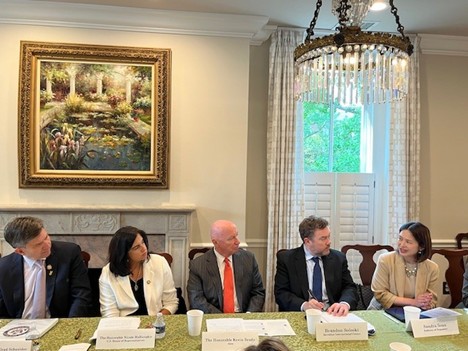Global Business Briefing with Representative Nicole Malliotakis (R-Ny) and Representative Brad Schneider (D-Il)

In the wake of COVID-19’s unprecedented strain on global medical logistics, the Medical Supply Chain Resiliency Act (MSCRA) represents a landmark, bipartisan effort to institutionalize the hard-won lessons of the pandemic. Representatives Nicole Malliotakis (R-NY) and Brad Schneider (D-IL) are firm supporters of the MSCRA, which combines immediate surge-capacity authorities with enduring incentives for domestic and allied‐nation production. On June 12, 2025 Meridian convened Representatives Malliotakis and Schneider for a discussion on how the MSCRA can provide a framework for trusted international partners to participate in reciprocal trade agreements and enhance supply chain resiliency.
These Were the Top Takeaways from the Program
1. De‐risking Medical Supply Investments through Pandemic Lessons
For executives in the life‐sciences and medical‐device sectors, COVID‐19 underscored that unmanaged supply‐chain risk translates directly into lost revenue and reputational damage. MSCRA’s strategic‐stock rotation programs give companies the confidence to invest in domestic production lines—knowing that government‐backed mechanisms will smooth sudden demand spikes and prevent costly shortages. By treating supply resilience as an asset class, rather than an afterthought, businesses can improve forecasting models, optimize working capital, and avoid the multi‐million‐dollar scramble seen in 2020.
2. Clarity and Continuity via Bipartisan, Phased Implementation
Uncertainty is the enemy of capital deployment. MSCRA’s step‐by‐step framework signals to CFOs and strategy teams that trade rules won’t be abruptly overturned with the next election cycle. This legislative certainty allows private‐sector partners to earmark R&D budgets, lock in multi‐year supplier contracts, and align manufacturing roadmaps with stable policy timelines, translating policy durability into lower cost of capital and more predictable ROI.
3. Friend‐shoring: A Blueprint for Supply‐Base Diversification
The era of “one-stop” sourcing is over. MSCRA incentivizes a networked approach—near-shoring critical inputs to the U.S. and friend-shoring to politically aligned allies like Poland, Singapore, and Costa Rica. For procurement leaders, this opens up new vendor pools, mitigates geopolitical risk, and leverages government‐facilitated channels for expedited customs and duty relief. Companies that proactively map and qualify dual-country suppliers will gain first‐mover advantage under the Act’s preferred‐partner provisions.
4. Streamlined Compliance through Regulatory Harmonization
Navigating disparate export controls, IP regimes, and device‐approval standards has historically burdened manufacturers with high compliance costs and time-to-market delays. MSCRA mandates that future trade agreements embed unified regulatory frameworks—especially for pharmaceuticals and medical devices—reducing redundant testing, accelerating FDA and EU‐equivalent clearances, and curbing litigation over IP disputes. Legal and regulatory affairs teams can now forecast approval timelines more accurately and reduce overhead by aligning protocols across jurisdictions.
5. Bridging to Manufacturing with Interim Incentives
While large-scale reshoring projects require multi-year capital outlays, MSCRA delivers near-term incentives—tariff exemptions on key medical inputs, tax credits for surge facilities, and grant programs for strategic inventories—that bridge the gap. Finance and operations leaders can leverage these provisions to underwrite initial facility upgrades, pilot lines, or regional distribution hubs, all while planning for the broader “Made in America” infrastructure push. The Act thus transforms government policy into a tactical playbook for sustained, scalable growth in the U.S. medical industrial base.
Project summary
| Global Business Briefing with Representative Nicole Malliotakis (R-Ny) and Representative Brad Schneider (D-Il) | |
|---|---|
| Impact Areas: | Business and Trade |
| Program Areas: | Corporate Diplomacy |
